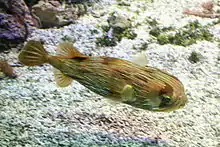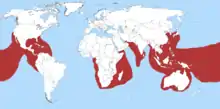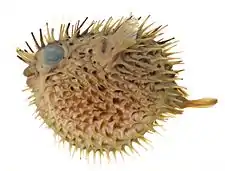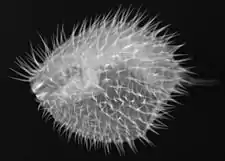Long-spine porcupinefish
The long-spine porcupinefish (Diodon holocanthus), also known as the freckled porcupinefish among other vernacular names, is a species of marine fish in the family Diodontidae.[2]
| Long-spine porcupinefish | |
|---|---|
 | |
| Scientific classification | |
| Kingdom: | |
| Phylum: | |
| Class: | |
| Order: | |
| Family: | |
| Genus: | |
| Species: | D. holocanthus |
| Binomial name | |
| Diodon holocanthus Linnaeus, 1758 | |
 | |
| Distribution of the long-spine porcupinefish | |
Diet
The species' diet includes sea urchins and hard-shelled mollusks.[3]
Distribution
The long-spine porcupinefish has a circumtropical in distribution, being found in the tropical zones of major seas and oceans:
- In the Atlantic it is found from Florida and the Bahamas to Brazil and in the Eastern Atlantic from 30°N to 23°S, as well as around South Africa.
- And In the western Indian Ocean from the southern Red Sea to Madagascar, Réunion and Mauritius.
- Also In the Pacific Ocean from southern Japan to Lord Howe Island, and east to the Hawaiian and Easter islands. Also from southern California to Colombia and the Galapagos Islands.[4]
Description


The long-spine porcupinefish is pale in colour with large black blotches and smaller black spots; these spots becoming fewer in number with age. It has many long, two-rooted depressible spines particularly on its head. The teeth of the two jaws are fused into a parrot-like "beak". Adults may reach 50 cm (20 in) in length.[5] The only other fish with which it might be confused is the black-blotched porcupinefish (Diodon liturosus), but it has much longer spines than that species.[6]
Diet
The long-spine porcupine fish is an omnivore that feeds on mollusks, sea urchins, hermit crabs, snails, and crabs during its active phase at night.[7] They use their beak combined with plates on the roof of their mouths to crush their prey such as mollusks and sea urchins that would otherwise be indigestible.[8]
Habitat
They are found over the muddy sea bottom, in estuaries, in lagoons or on coral and rocky reefs around the world in tropical and subtropical seas.[9]
Spawning
Spawns at the surface at dawn or at dusk in pairs or in groups of males with a single female; the juveniles remain pelagic until they are at least 7 cm (3 in) long.[5] Young and sub-adult fish sometimes occur in groups.
Uses
It is used in Chinese medicine, and is captured at the surface with a hand net. It is poisonous if not prepared correctly. It is also found in the aquarium trade.
References
- Leis, J.L., Matsuura, K., Shao, K.-T., Hardy, G., Zapfe, G., Liu, M., Jing, L., Tyler, J. & Robertson, R. (2015). Diodon holocanthus. The IUCN Red List of Threatened Species doi:10.2305/IUCN.UK.2015-4.RLTS.T193817A2282138.en
- "Common Names List – Diodon holocanthus". FishBase. Retrieved 7 September 2014.
- Tristan Lougher (2006). What Fish?: A Buyer's Guide to Marine Fish. Interpet Publishing. ISBN 978-1-84286-118-9.
- Froese, Rainer and Pauly, Daniel, eds. (2007). "diodon holocanthus" in FishBase. 6 2007 version.
- Lieske, E. and Myers, R.F. (2004) Coral reef guide; Red Sea London, HarperCollins ISBN 0-00-715986-2
- "Black-blotched porcupinefish: Diodon liturosus Shaw, 1804". Australian Museum. Retrieved 2013-12-15.
- Leis, J.M., 2001. Diodontidae. Porcupine fishes (burrfishes). p. 3958-3965. In K.E. Carpenter and V. Niem (eds.) FAO species identification guide for fishery purposes. The living marine resources of the Western Central Pacific. Vol. 6. Bony fishes part 4 (Labridae to Latimeriidae), estuarine crocodiles. FAO, Rome.
- "Porcupinefishes". Australian museum. Retrieved 2013-12-15.
- Kuiter, R.H. and T. Tonozuka, (2001). Pictorial guide to Indonesian reef fishes. Part 3. Jawfishes – Sunfishes, Opistognathidae – Molidae. Zoonetics, Australia. pp. 623–893.
External links
| Wikimedia Commons has media related to Diodon holocanthus. |
- http://www.marinespecies.org/aphia.php?p=taxdetails&id=127402
- http://fran.cornu.free.fr/affichage/affichage_nom.php?id_espece=1209
- Photos of Long-spine porcupinefish on Sealife Collection
 Media related to Diodon holocanthus at Wikimedia Commons
Media related to Diodon holocanthus at Wikimedia Commons Data related to Diodon holocanthus at Wikispecies
Data related to Diodon holocanthus at Wikispecies
